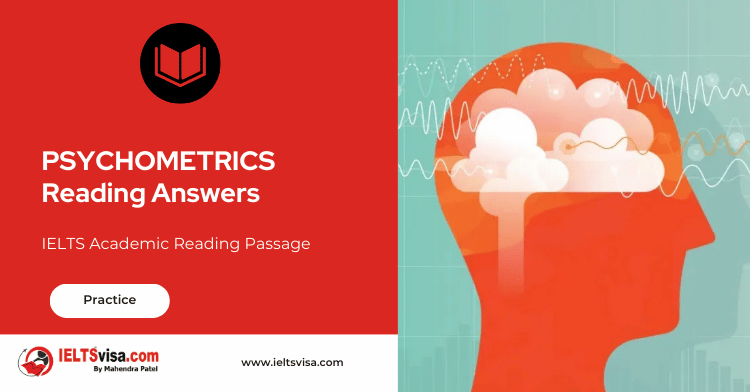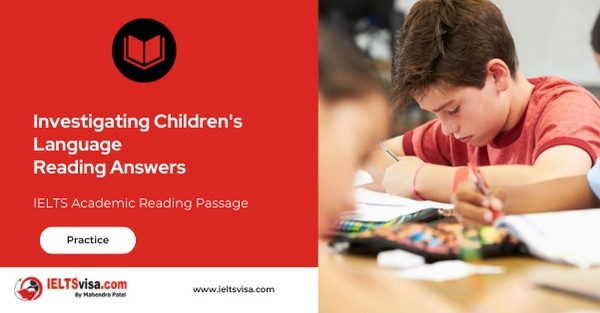PSYCHOMETRICS Reading Answers
IELTS Academic Reading Passage
A. Psychometrics involves psychological and educational assessment of the subject by way of measuring attitudes, personality, abilities, and knowledge. The field has two primary focuses; the creation of measurement instruments and procedures and development and enhancement of existing methodology employed.
B. The concept of psychometric testing introduced long before the establishment of IQ testing and other current methodologies, was first explored by Francis Galton who developed the first testing procedures supposedly related to intelligence; however, his measurement tools were in fact based upon physical and physiological benchmarks rather than testing of the mind itself. Measurements included the physical power, height, and weight of subjects which were recorded and results used to estimate the intelligence of subjects. While the approach was not successful, the studies conducted by Galton were to influence the work of future researchers. Approaches to measurement of intelligence, which is defined as the mind’s relative ability to reason, think, conceptually plan, solve problems, understand and learn, were later developed by pioneers such as Charles Spearman. Significant contributions to its early development were also made by Wilhelm Wundt, L.L. Thurstone, Ernst Heinrich Weber, and Gustav Fechner.
C. The most well-known traditional approach to the development of psychometric instruments to measure intelligence is the Stanford-Binet IQ test, originally developed by French psychologist Alfred Binet. Researchers define intelligence as separate to other attributes such as personality, character, creativity and even knowledge and wisdom for their assessment. Intelligence testing methods are not intended to determine a level of genetic intelligence separate from and unaffected by the environment to which the individual has been exposed to in life; rather measure the intelligence of an individual appears as a result of both nature and nurture. Psychometrics is today a useful and widely used tool used for measurement of abilities in academic areas such as reading, writing, and mathematics.
D. IQ tests are commonly used to test intelligence, though some believe that this testing is unfair and not truly representative of the subject’s intellect as individuals may excel in different areas of reasoning. Psychologist Howard Gardner, working on this assumption, introduced the concept of an individual cognitive profile in 1983 in his book Frames of Mind: The Theory of Multiple Intelligences. He holds that one child may perform excellently in one aspect, yet fail in another and that their overall performance in a number of intellectual areas should be considered. Gardner first identified seven different types of intelligence, these being; linguistic, logical-mathematical, spatial, bodily-kinesthetic, musical, interpersonal and intrapersonal. In 1999 after further research he added the 8th element to the equation; naturalistic intelligence, and at the time of writing is investigating the possibility of a 9th; this being existential intelligence.
E. The first intelligence as defined by Gardner in the Theory of Multiple Intelligences, linguistic intelligence, relates to an individual’s ability to process and communicate written and spoken words. Such people are said to excel at reading, writing, story-telling, learning a foreign language and the memorizing of words and dates. The logical-mathematical category is related to a person’s ability to reason logically, think scientifically, make deductions and perform well in mathematic calculations. Spatial intelligence is related to vision and spatial judgment; such individuals have been observed to have a strong visual memory and the potential to excel in artistic subjects. Those exhibiting a leaning towards the third classification, bodily-kinesthetic intelligence, often learn best by physically practising an action rather than by reading or seeing.
F. Musical intelligence, as the name suggests, relates to ability in defining differences in rhythm and tones; individuals possessing musical intelligence are often able to sing, play musical instruments and compose music to a high standard. Since a high level of audio-related ability exists, many in this category are said to learn well in a lecture situation where they are required to listen attentively to information. Interpersonal intelligence relates to an individual’s ability to communicate and empathize with others; typically extrovert, they learn well through discussion, debate, and interaction with others. The last of the 7 original categories identified by Gardner, intrapersonal intelligence, fit the opposite description of interpersonal intelligence; such individuals working best independently. According to Gardner they are capable of high levels of self-reflection and are often perfectionists.
G. A number of psychometric experts, however, oppose Gardner’s view and have reservations about the validity of his theories. Firstly, some detractors disagree with the overall definition of intelligence used in Gardner’s theory. They hold that some categories such as interpersonal or intrapersonal intelligence relate more to personality than cognitive performance. The more recently identified naturalistic intelligence, which relates to an affinity to the natural world and an ability to nurture and cultivate, has been dismissed completely by many as no more than a hobby. Doubts have been raised that others, such as musical intelligence, are in real talents. A final criticism attached to the theory is that some believe that the intelligences cannot be treated as separate entities as some individuals may perform equally well in what could be considered diverse areas; linguistic and logical-mathematical for example. Gardner, however, maintains that his theories are sound since an identifiable and separate part of the brain is responsible for controlling aspects related to each of the different types of intelligence.
H. Despite the criticism received from some of his contemporaries, Gardner’s theories are well respected and often applied in the world of education as a tool for identifying children’s differing abilities and potential career paths. For instance, those showing linguistic capabilities are said to be ideal in roles including writing, politics, and teaching; logical-mathematical thinkers suited to careers in science, mathematics, law, medicine and philosophy. Those exhibiting spatial intelligence are said to be suited to a career such as art, engineering or architecture; while individuals with a leaning towards bodily-kinesthetic intelligence may excel in areas such as athletics, dancing or craft-making. Strengths in the area of musical intelligence are said to often lead to success as a singer, conductor or musician. Those displaying strong interpersonal skills have been recognized as often making effective politicians, managers, diplomats and social workers; while those showing a dominant intrapersonal intelligence are said to be better suited to professions involving more self-reflection and lower levels of interaction with the outside world such as writing, philosophy or theology.
Questions 1 – 5.
Reading Passage has eight paragraphs A-H. Which paragraph contains the following information?
Write the correct letter A-H in boxes 1-5 on your answer sheet.
NB.You may use any letter more than once.
1) Physiological evidence from Gardner that his intelligence theories are sound.
2) Aims of intelligence testing
3) Initial failure in successful measurement
4) How high level social skills are linked and classified as interpersonal intelligence.
5) Differences in opinions on what constitutes talent or intelligence
Questions 6 – 11.
Do the following statements agree with the information given in Reading Passage 3?
In boxes 32-37 on your answer sheet write
TRUE if the statement agrees with the information
FALSE if the statement contradicts the information
NOT GIVEN if there is no information about this
6) Early studies into intelligence were misguided and have had no impact on today’s methods.
7) Research into IQ is designed to determine the level of intelligence an individual is born with.
8) Howard Gardner has confirmed 9 different types of intelligence.
9) Spatial intelligence has been linked to creativity.
10) An individual may demonstrate high levels of intelligence in contradictory areas.
11) Those demonstrating intrapersonal intelligence always make bad managers.
Questions 12 – 14.
Choose the correct letter A, B, C, or D.
Write your answers in boxes 12-14 on your answer sheet.
12. Some believe that IQ tests do not correctly estimate an individual’s intelligence because
A. The tests are based on physical and physiological benchmarks.
B. Some people may perform badly on the day of the test.
C. While people may have weaknesses in one area, they may have strengths in others.
D. The tests do not accurately assess the person’s ability to reason, think and solve problems.
13. The intelligence, as classified by Gardner, relating to an ability to memorise items seen is
A. Linguistic intelligence.
B. Logico-mathematical intelligence.
C. Spatial intelligence.
D. Bodily-kinesthetic intelligence.
14. The harshest criticism of Gardner’s theory has been focussed towards
A. Interpersonal intelligence.
B. Intrapersonal intelligence.
C. Musical intelligence.
D. Naturalistic intelligence.

Solution For: PSYCHOMETRICS
Reading Answers
| Q & A | Q & A |
|---|---|
| 1 – G | 8 – FALSE |
| 2 – C | 9 – TRUE |
| 3 – B | 10 – TRUE |
| 4 – F | 11 – NOT GIVEN |
| 5 – C | 12 – C |
| 6 – FALSE | 13 – C |
| 7 – FALSE | 14 – D |
Review and Practice
- Regularly practice with IELTS reading samples and time yourself to get used to the pressure of the exam.
- Review your mistakes to understand where you went wrong and how to avoid similar errors in the future.
Our Books
Master IELTS Speaking Part 1
IELTS Writing Task 1 Book
IELTS Writing Task 2 Book
PSYCHOMETRICS Reading Answers Explanation
Comin Soon
Practice IELTS Other Modules
IELTS Listening
The IELTS Listening test assesses how well you can understand spoken English in various contexts. It lasts about 30 minutes and is divided into four sections with a total of 40 questions. The listening tasks become increasingly difficult as the test progresses.
IELTS Academic Reading
The IELTS Academic Reading section assesses your ability to understand and interpret a variety of texts in academic settings. It is designed to evaluate a range of reading skills, including skimming for gist, reading for main ideas, reading for detail, understanding inferences, and recognizing a writer's opinions and arguments.
IELTS Speaking
The IELTS Speaking test assesses your ability to communicate in English on everyday topics. It lasts 11-14 minutes and consists of three parts: introduction, cue card, and a discussion based on the cue card topic.
IELTS General Reading
IELTS General Reading tests your ability to understand and interpret various types of texts. Here are some key areas and types of content you can expect to encounter in the reading section, along with tips for effective preparation.
IELTS Academic Writing Task 1
In IELTS Academic Writing Task 1, you are presented with a visual representation of information, such as graphs, charts, tables, or diagrams, and you are required to summarize, compare, or explain the data in your own words.
IELTS General Writing Task 1
In IELTS General Writing Task 1, you are required to write a letter based on a given situation. The letter can be formal, semi-formal, or informal, depending on the prompt. Here’s a breakdown of the key components to include in your letter
IELTS Academic Writing Task 2
In IELTS Academic Writing Task 2, you are required to write an essay in response to a question or topic. Here’s a guide to help you understand the essential elements of this task
IELTS Exam Tips
To succeed in the IELTS exam, practice regularly, familiarize yourself with the test format, improve your vocabulary, develop time management skills, and take mock tests to build confidence.
Grammer for IELTS
Grammar is the foundation of effective communication in English. Understanding tense usage, subject-verb agreement, and sentence structure enhances clarity and coherence in writing and speaking.
Vocabulary for IELTS
Vocabulary plays a crucial role in the IELTS (International English Language Testing System) exam, especially in the Speaking and Writing sections. Here’s an overview of why vocabulary is important and how it impacts your performance
RECENT IELTS SAMPLES QUESTIONS AND ANSWERS
Back to the Future Skyscraper Design
A. “The Recovery of Natural Environments in Architecture” by Professor Alan Short represents...
UNMASKING SKIN
AIf you took off your skin and laid it flat, it would cover an area of about twenty-one square...
The World is Our Oyster Reading Answer
A. Independent travel is on the increase and while package holidays which offer an all...
Investigating Children’s Language
A For over 200 years, there has been an interest in the way children learn to speak and...
Why companies should welcome disorder
A Organisation is big business. Whether it is of our lives – all those inboxes and calendars –...
Saving bugs to find new drugs
A More drugs than you might think are derived from, or inspired by, compounds found in living...













